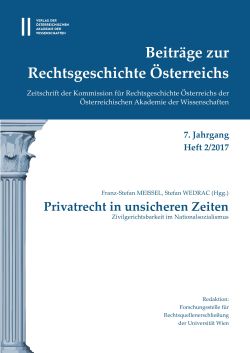

Beiträge zur Rechtsgeschichte Österreichs 2 / 2017, pp. 239-251, 2017/12/20
Privatrecht in unsicheren Zeiten
Zivilgerichtsbarkeit im Nationalsozialismus

In the course of the inheritance law reform of 1938, the Testaments Act (Testamentsgesetz, TestG) was enacted, changing, and sometimes liberalizing, the formal requirements for testaments. This article sets out to analyze the provisions of s. 48(2) TestG, which were meant to counterbalance the liberalization by imposing an obligation for testators to comply with the so-called “healthy popular sensibilities” of the ‘Aryan’ German community. Noncompliance with this obligation implied the nullity of the testament. The article analyzes the interpretation of s. 48(2) TestG in the rulings of the Vienna Regional Court from 1938 to 1945.
Keywords: § 48 Abs. 2 TestG – Austrian Civil Jurisdiction – Generalklausel (general clause) – „Gesundes Volksempfinden“ (“healthy popular sensibilities”) – Inheritance Law